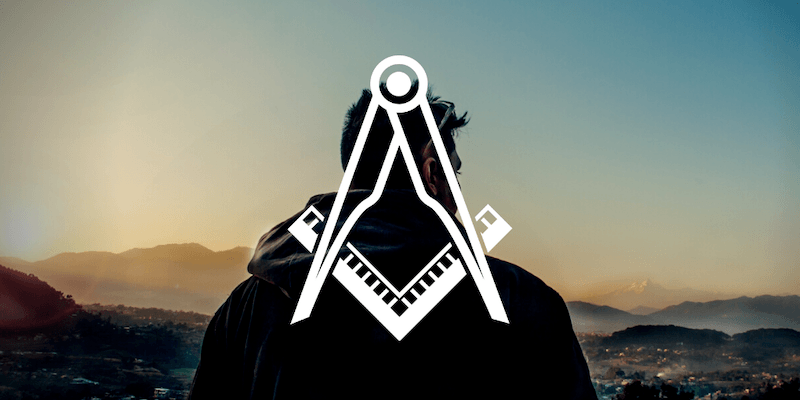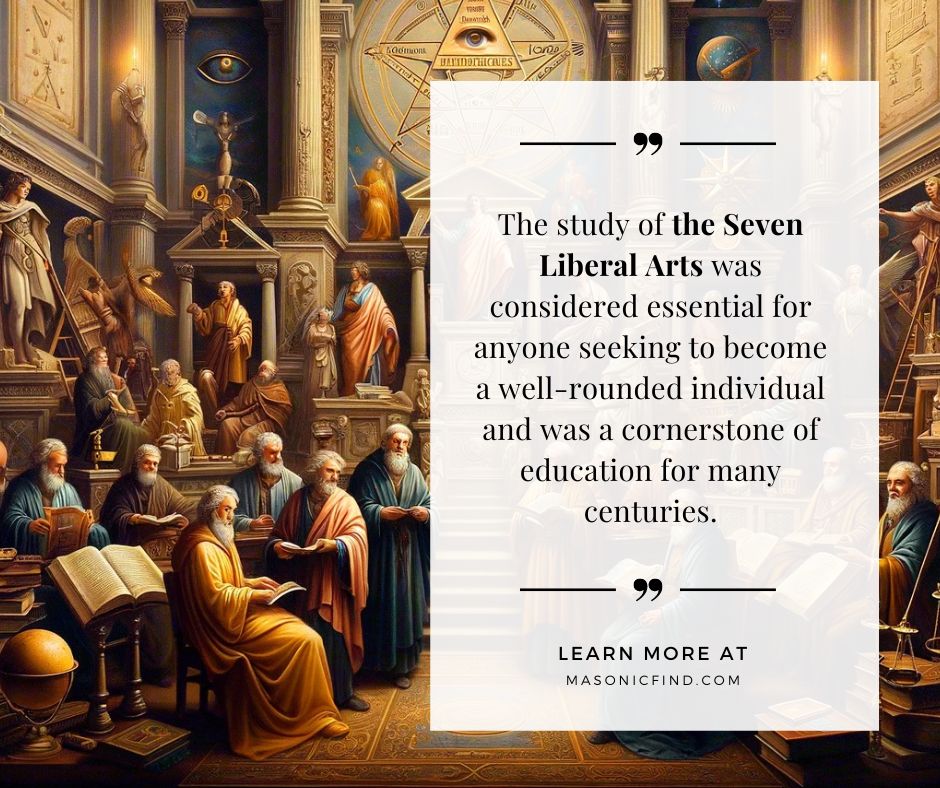The seven liberal arts of Freemasonry are grammar, rhetoric, logic, arithmetic, geometry, music, and astronomy.
Each of these disciplines has its own unique value and importance, and together they form a comprehensive system of knowledge that is essential for the growth and development of the individual.
In this article, we will explore the seven liberal arts of Freemasonry in more detail, examining their history, significance, and relevance to modern-day Freemasonry.

The Seven Liberal Arts
Grammar
Grammar is the study of language and its rules. In Freemasonry, it represents the foundation for asking questions, such as who, what, where, and why. It challenges incoming data and information and instead of accepting it at face value, it encourages critical thinking and analysis.
Rhetoric
Rhetoric is the art of persuasion through language. In Freemasonry, it represents the ability to communicate effectively and influence others. It involves the study of language, grammar, and style, as well as the ability to use language to convey ideas and emotions.
Logic
Logic is the study of reasoning and argumentation. In Freemasonry, it represents the ability to think critically and evaluate arguments. It involves the study of formal and informal logic, as well as the ability to recognize fallacies and evaluate the validity of arguments.
Arithmetic
Arithmetic is the study of numbers and their properties. In Freemasonry, it represents the ability to understand and use numbers in a practical way. It involves the study of arithmetic operations, fractions, decimals, and percentages.
Geometry
Geometry is the study of shapes, sizes, and positions of objects. In Freemasonry, it represents the ability to understand and use spatial relationships. It involves the study of lines, angles, shapes, and figures, as well as the ability to use this knowledge to solve problems.
Music
Music is the study of sound and its properties. In Freemasonry, it represents the ability to appreciate and understand the emotional power of music. It involves the study of music theory, composition, and performance.
Astronomy
Astronomy is the study of celestial objects and their properties. In Freemasonry, it represents the ability to understand the universe and one’s place in it. It involves the study of planets, stars, galaxies, and other celestial objects, as well as the ability to use this knowledge to navigate and explore the world.
A History of the Seven Liberal Arts in Freemasonry
The Seven Liberal Arts have been an essential part of Freemasonry since its inception.
The roots of the Seven Liberal Arts can be traced back to ancient Greece, where Plato and Pythagoras first codified their importance.
The flowering of Western understanding of the liberal arts took place in medieval education systems, where they were categorized into the Trivium and the Quadrivium.
The Trivium consists of grammar, logic, and rhetoric, while the Quadrivium consists of arithmetic, geometry, music, and astronomy.
These seven subjects were considered the foundation of a well-rounded education and were taught to students in ancient Greece and medieval Europe.
Freemasonry has always placed great importance on the Seven Liberal Arts.
In the Fellowcraft Degree, Freemasons are encouraged to study the Seven Liberal Arts and Sciences.
Each of the seven areas of knowledge has layers of Masonic meanings that can be uncovered through study.
The Seven Liberal Arts are also incorporated into many degree rites in Freemasonry.
For example, the Fellowcraft Degree is centered around the study of the Seven Liberal Arts, with each of the seven subjects representing a different step on the winding stairs.
In addition to being an essential part of Freemasonry, the Seven Liberal Arts have also been influential in the development of Western thought and culture.
The study of the Seven Liberal Arts was considered essential for anyone seeking to become a well-rounded individual and was a cornerstone of education for many centuries.
Overall, the Seven Liberal Arts have played a vital role in Freemasonry and Western culture as a whole.
By studying these seven subjects, individuals can gain a deeper understanding of the world around them and become better-rounded individuals.
Importance of the Seven Liberal Arts in Freemasonry

The Seven Liberal Arts have been an integral part of Freemasonry since ancient times.
The Fellowcraft Degree in Freemasonry commends its members to study the Liberal Arts and Sciences, which are grammar, rhetoric, logic, arithmetic, geometry, music, and astronomy.
The importance of these seven areas of knowledge lies in their ability to teach Masons to think critically and to pursue knowledge throughout their lives.
Grammar
Grammar is the foundation for asking questions, who, what, where, and why.
It challenges the incoming data and information and instead of accepting it as fact, it encourages Masons to question and analyze it.
The study of grammar teaches Masons how to communicate effectively and efficiently, which is essential for clear and concise communication within the Lodge.
Logic
Logic is the art of reasoning. It teaches Masons how to think critically and to analyze information in a systematic and logical manner.
The study of logic is essential for decision-making, problem-solving, and critical thinking. It allows Masons to examine information, weigh the pros and cons, and make informed decisions.
Rhetoric
Rhetoric is the art of persuasion. It teaches Masons how to communicate effectively and persuasively.
The study of rhetoric is essential for public speaking, leadership, and the ability to influence others.
It allows Masons to communicate their ideas and beliefs in a clear and compelling manner.
Arithmetic
Arithmetic is the foundation of mathematics.
It teaches Masons how to work with numbers and to perform basic mathematical operations.
The study of arithmetic is essential for financial management, budgeting, and understanding numerical data.
Geometry
Geometry is the study of shapes and their properties.
It teaches Masons how to think spatially and to understand the relationships between objects.
The study of geometry is essential for architecture, engineering, and design.
Music
Music is the art of sound. It teaches Masons how to appreciate and create music.
The study of music is essential for understanding the power of sound and its effect on the human psyche.
Astronomy
Astronomy is the study of the stars and the universe. It teaches Masons how to appreciate the beauty and vastness of the cosmos.
The study of astronomy is essential for understanding our place in the universe and our connection to the divine.
Through the study of the liberal arts, Masons learn to communicate effectively, think critically, and solve problems creatively.
They also gain a deeper understanding of the natural world and their place in it.
These skills and knowledge are essential for Masons to fulfill their duty to themselves, their families, their communities, and their country.